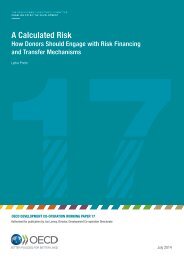UNIVERSITY
Livelihood_resilience_working_paper22
Livelihood_resilience_working_paper22
Create successful ePaper yourself
Turn your PDF publications into a flip-book with our unique Google optimized e-Paper software.
on climate change, with the aim of keeping global warming below 2°C and to achieve full <br />
climate neutrality by the end of the century. The meeting will mark a decisive stage in the <br />
negotiations on the future international agreement for a post-‐2020 regime xxxix . <br />
Much is at stake, and it is important not to forget those who are in most need of international <br />
frameworks: the poor and most vulnerable. The risk when establishing four parallel framework <br />
tracks of this size is that they may lack coherence and result in separate outputs.<br />
Resilient livelihoods in a changing world <br />
How climatic stress affects the livelihoods of the most vulnerable <br />
Livelihood systems are an essential framework for human organization. They include social and <br />
economic networks, maintain cultural practices and enable upward socio-‐economic mobility over <br />
generations. Livelihoods are sustainable when they enhance the wellbeing of current and future <br />
generations without degrading the environment or depleting resource bases (Chambers & Conway <br />
1992). Livelihood shocks, whether economic, environmental, socio-‐cultural or health-‐related, can <br />
undermine long-‐term development prospects and push people into cycles of poverty and unhealthy <br />
living conditions (Wilkinson & Peters 2015). <br />
Climate change increases the pressure on already vulnerable livelihoods, and particularly those that <br />
depend on natural resources. It also prolongs already existing poverty loops, expands inequalities, <br />
heightens food-‐insecurity and inhibits economic growth, poverty reduction and sustainable <br />
development. Recovery from losses and damages is more difficult for the most vulnerable people <br />
whose livelihood security depends on land and other natural resources. Disaster risk reduction, <br />
access and control of local resources, social safety nets, diverse livelihood opportunities and secure <br />
income assets are key priorities that should be included in a sustainable development model. <br />
Cooperation between individuals and governments, and between national and sub-‐national levels, is <br />
crucial in ensuring effective adaptation responses to climatic stress. Poor planning which only <br />
focuses on short-‐term solutions or which is incapable to assess longer-‐term consequences, will likely <br />
result in mal-‐adaptation, which in turn will increase the vulnerability of already vulnerable groups, <br />
and limit future choices by locking vulnerable people into cycles of dependence (IPCC WG2 AR5 <br />
2014). <br />
Resilience – an integrating concept <br />
Definitions of resilience are heavily informed by work on linked social-‐ecological systems. According <br />
to this research, a resilient system is one that is able to retain core structures and functions in the <br />
face of significant disturbances, while still retaining the ability to change and develop (Nelson et al. <br />
2010). The resilience concept has proved popular as a way of thinking beyond coping strategies and <br />
moving towards adaptation to changing environmental conditions that entail the capacity to <br />
cooperate, learn and further enhance resilience under future conditions (Moser 2008). <br />
Resilience has emerged as an increasingly popular concept in the context of climate change and <br />
development, bringing together a range of overlapping issues, including adaptation, disaster risk <br />
reduction, poverty reduction, food security, nutrition and conflict. According to Bahadur et al. (2013) <br />
xxxix UNFCCC (2015) http://unfccc.int/meetings/paris_nov_2015/meeting/8926.php



